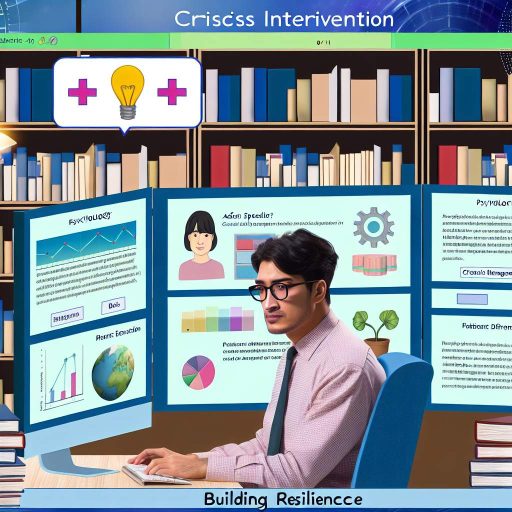Introduction:
In today’s society, case managers play a crucial role in ensuring the well-being of the community.
Understanding the impact of case managers on community well-being is essential for sustainable development.
Definition and Responsibilities of Case Managers in the Community:
Case managers play a vital role in supporting the well-being of the community by providing necessary assistance and services to individuals in need.
They act as advocates, coordinators, and counselors, ensuring that the community members receive the support they require to thrive.
What Case Managers Do:
- Assess the needs of individuals and families in the community.
- Develop individualized care plans to address those needs effectively.
- Coordinate services and resources to meet the identified needs.
- Monitor progress and make adjustments to the care plans as necessary.
- Advocate for the rights and best interests of the individuals they serve.
- Provide counseling and support to help individuals overcome challenges.
- Collaborate with other professionals and community organizations to ensure comprehensive care.
Roles and Responsibilities in Supporting Community Well-being:
- Empower individuals to take control of their health and well-being.
- Facilitate access to healthcare services, social support, and community resources.
- Promote education and awareness about health and wellness in the community.
- Address social determinants of health that impact individuals’ well-being.
- Provide crisis intervention and support during challenging times.
- Advocate for policies and programs that benefit the community as a whole.
Case managers play a crucial role in enhancing the overall well-being of the community by providing personalized care, support, and advocacy to individuals in need.
Their dedication and commitment help create a healthier and more vibrant community for everyone.
Importance of case managers in supporting vulnerable populations:
Case managers help marginalized groups access resources and services.
They advocate for the needs of vulnerable populations.
Case managers provide a bridge between clients and support systems.
They assist individuals in navigating complex social service systems.
Case managers offer emotional support and guidance to those in need.
- Case managers help clients secure stable housing and employment.
- They connect individuals with healthcare services and mental health resources.
- Case managers empower clients to set and achieve personal goals.
- They collaborate with other service providers to ensure holistic care.
- Case managers promote self-sufficiency and independence among vulnerable populations.
Explore Further: Understanding the Role of a Child Welfare Specialist
Collaboration with Other Professionals and Organizations:
Working with Healthcare Providers:
Case managers often collaborate with healthcare providers to ensure clients receive comprehensive care.
This collaboration involves sharing information, coordinating services, and addressing medical needs effectively.
Working with Social Workers:
Case managers and social workers collaborate to address the social determinants of health for clients.
They work together to provide resources, support, and interventions to improve well-being.
Working with Community Agencies:
Case managers partner with community agencies to connect clients with local resources and support services.
Collaboration with these agencies helps meet the diverse needs of individuals and families in the community.
Benefits of Interdisciplinary Collaboration:
- Increased access to resources: Collaboration with other professionals expands the range of services available to clients.
- Improved communication: Interdisciplinary collaboration facilitates information sharing and ensures coordinated care.
- Holistic approach to care: Working with different professionals enables a comprehensive assessment and tailored interventions.
- Enhanced support system: Collaborating with multiple professionals builds a strong network of support for clients.
- Increased efficiency: Interdisciplinary collaboration streamlines services and eliminates duplication of efforts.
- Better outcomes: By combining expertise from various fields, interdisciplinary collaboration leads to improved well-being.
Collaboration with healthcare providers, social workers, and community agencies is vital for enhancing community well-being.
Interdisciplinary teamwork allows case managers to provide holistic care, access resources, and improve outcomes for clients.
Transform Your Career Today
Unlock a personalized career strategy that drives real results. Get tailored advice and a roadmap designed just for you.
Start NowFind Out More: Key Benefits of Hiring a Life Skills Instructor
Case studies and success stories:
-
One particular case manager, Sarah, helped a homeless man named John find stable housing.
-
John had been living on the streets for years before Sarah connected him with a local shelter.
-
Sarah worked tirelessly to advocate for John and ensure he received the support he needed.
-
Thanks to Sarah’s intervention, John now has a safe place to call home and access to essential services.
-
Another success story involves a single mother, Emily, who was struggling to make ends meet.
-
Emily was referred to a case manager, Alex, who helped her navigate the complex social services system.
-
With Alex’s guidance, Emily was able to secure childcare assistance and job training opportunities.
-
Today, Emily is gainfully employed and able to provide for her children, thanks to Alex’s support.
These case studies highlight the real impact that case managers can have on individuals and families in the community.
By providing personalized support and advocacy, case managers can help individuals overcome barriers and achieve their goals.
See Related Content: Employment Specialist: Crafting the Perfect Job Match
When it comes to the impact of case managers on community well-being, it is important to acknowledge the challenges and obstacles they face in their work.
These barriers can hinder their ability to effectively support their clients and make a positive difference in the community.
Limited Resources:
One of the major challenges for case managers is the limited resources available to them.
This can include funding constraints, a lack of access to necessary services, or insufficient staffing levels.
Without adequate resources, case managers may struggle to meet the needs of their clients and help them achieve their goals.
Heavy Workload:
Case managers often have heavy workloads, with a large number of clients to support and limited time to dedicate to each individual.
This can lead to burnout, decreased job satisfaction, and a reduced ability to provide high-quality care.
It is essential for organizations to ensure that case managers have manageable caseloads to prevent these negative consequences.
Communication Challenges:
Communication is key in the work of case managers, as they need to interact with clients, other professionals, and community resources regularly.
However, communication challenges such as language barriers, cultural differences, or lack of coordination between different service providers can make it difficult for case managers to effectively advocate for their clients.
They must ensure they receive the support they need.
Complex Systems:
Case managers often need to navigate complex systems, such as healthcare, social services, or legal systems, to help their clients access the resources they need.
Understanding these systems and knowing how to advocate for clients within them can be a daunting task, especially for new or inexperienced case managers.
It is crucial for organizations to provide training and support to help case managers navigate these complex systems effectively.
Emotional Toll:
Working as a case manager can be emotionally challenging, as they are often exposed to clients who are facing difficult situations, such as homelessness, domestic violence, or mental health issues.
Showcase Your Business Today
Reach thousands of readers actively exploring professional services. Publish your business profile and grow your audience now.
Publish NowWitnessing the struggles of their clients can take a toll on case managers’ mental health and well-being, leading to compassion fatigue or burnout.
It is essential for organizations to offer emotional support and self-care resources to help case managers cope with the emotional demands of their work.
By addressing these challenges and providing adequate support and resources, organizations can help case managers overcome these obstacles and continue to make a positive impact on the well-being of their clients and the community as a whole.
Explore Further: Substance Abuse Counselor Interview Tips

Training and Qualifications for Case Managers:
Education and experience requirements for individuals pursuing a career as a case manager:
In order to become a case manager, individuals typically need to have a bachelor’s degree in social work, psychology, counseling, or a related field.
Some employers may require a master’s degree for certain positions.
Additionally, gaining experience in social services through internships or volunteer work can be beneficial for individuals looking to enter the field of case management.
Importance of Ongoing Professional Development and Training for Case Managers:
Continuous professional development and training are essential for case managers to stay up-to-date with best practices, regulations, and policies that impact the community.
By participating in workshops, seminars, and conferences, case managers can enhance their skills and knowledge, ultimately improving their ability to effectively support the individuals and families they work with.
Moreover, ongoing training allows case managers to learn about new evidence-based practices and interventions that can positively impact the well-being of the community.
By staying informed about the latest research and trends in social services, case managers can adapt their approaches and strategies to better meet the diverse and evolving needs of the community they serve.
Furthermore, professional development opportunities provide case managers with a platform to network with other professionals in the field, exchange ideas, and collaborate on innovative solutions to address community challenges.
Building relationships with colleagues and experts can help case managers broaden their perspectives, gain new insights, and leverage collective expertise to create positive change in the community.
Investing in training and professional development for case managers is not only beneficial for the individuals themselves but also for the overall well-being of the community.
By equipping case managers with the necessary skills, knowledge, and resources, they can play a pivotal role in supporting and empowering individuals and families to lead healthier, happier, and more fulfilling lives.
Evaluation and Measurement of Impact
Assessing the effectiveness of case managers in promoting community well-being is crucial.
Various tools and methodologies are utilized to measure outcomes and evaluate their impact.
Measurement Approaches
- One common approach is the use of surveys to gather feedback from community members.
- Quantitative data such as statistical analysis helps in measuring the tangible results of interventions.
- Qualitative assessments focus on capturing the subjective experiences and feelings of individuals.
Data Collection Methods
- Case managers often collect data through direct observations of community interactions and activities.
- Interviews with stakeholders provide valuable insights into the perceived impact of interventions.
- Document reviews help in analyzing trends and identifying areas for improvement.
Outcome Evaluation Tools
- Logic models are used to visually represent the relationships between inputs, activities, and outcomes.
- Community mapping techniques allow for the visualization of resources and gaps in service provision.
- Surveys and questionnaires help in quantifying changes in community well-being over time.
Impact Assessment Strategies
- Comparative analysis involves comparing data before and after interventions to measure impact.
- Cost-benefit analysis evaluates the economic efficiency of case management programs in promoting well-being.
- Stakeholder consultations ensure that the perspectives of diverse community members are taken into account.
Challenges in Evaluation
- One primary challenge is ensuring the validity and reliability of data collected through various methods.
- Measuring intangible outcomes such as improved quality of life or social cohesion can be complex.
- Short-term evaluations may not capture the long-term impact of case management interventions on communities.
Significance of Effective Evaluation
Effective evaluation and measurement of impact are essential for assessing the contribution of case managers to community well-being.
Using a combination of quantitative and qualitative tools can provide a comprehensive understanding of their effectiveness.
Role of Case Managers in Community Well-Being
Case managers serve as vital pillars in the community well-being framework.
They provide crucial support and resources to individuals in need.
This ensures their holistic well-being.
Their role in coordinating services, advocating for clients, and empowering communities cannot be overstated.
Case managers act as catalysts for positive change.
They foster resilience and promote social cohesion.
Their impact is far-reaching and profound, touching the lives of many.
It is imperative that we recognize and appreciate the significant role they play in our communities.
Therefore, we must continue to support and empower case managers in their mission to enhance community well-being.
Let us unite in our efforts to acknowledge and promote the invaluable contributions of case managers.
Together, we can create healthier, happier, and more resilient communities for all.
Additional Resources
Strengthening Services for Unaccompanied Children in U.S. …
ORR Unaccompanied Children Bureau Policy Guide: Section 6 …
[E-Books for Sale]
The Big Book of 500 High-Paying Jobs in America: Unlock Your Earning Potential
$19.99 • 500 High-Paying Jobs • 330 pages
Explore 500 high-paying jobs in America and learn how to boost your career, earn more, and achieve success!
See All 500 High-Paying Jobs of this E-Book
1001 Professions Without a Degree: High-Paying American Jobs You Can Start Now
$19.99 • 1001 Professions Without a Degree • 174 pages
Discover 1001 high-paying jobs without a degree! Unlock career tips, skills, and success strategies for just $19.99!




